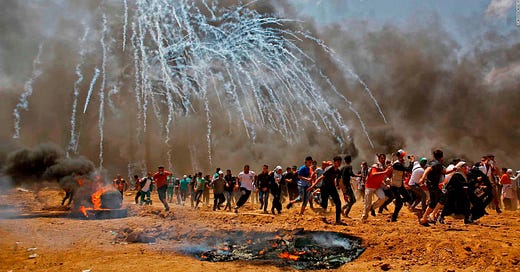The October 7 attacks by Hamas on Israel, saw the world witness another brutal episode in the ongoing Israel-Palestine conflict.
In the washup, world leaders and commentators have been quick to voice their support for Israel's right to self-defence, especially when the claim the attack was unprovoked.
But for Palestinians who have been living in conditions that have dehumanised them where consistent reports for decades of their appalling treatment by the Israeli Government, maybe, the attacks weren’t as provoked as has been made out.
In any dance it takes two to tango. Neither Hamas nor the Israeli Government should be held up as saviors of their people – both are terrorist organisations.
One is a state authority, the other not, and yet the brutality both have committed are no different. Hamas’s comes in strategic random attacks, and the Israeli Government for its devastating military power and treatment of Palestinians over decades.
However, in the maze of international politics, a significant aspect often overlooked or sidelined – is the rights of Palestinian people and the decades-long oppression they’ve endured.
The defence of any nation against external threats is a legitimate right recognised under international law, what remains disturbing is the ongoing systemic subjugation of Palestinians by the Israeli government.
This isn’t merely about one side versus the other; it’s about recognising Palestinian lives are as valuable and deserving of rights, dignity, and self-determination as Israeli lives.
Benjamin Netanyahu's leadership has consistently been at the centre of controversy, with policies and actions many describe as bearing the hallmarks of ethnic cleansing – another form of insidious terrorism.
The aggressive settlement expansion in Palestinian territories, coupled with frequent military actions in Gaza and the West Bank, not only perpetuates the cycle of violence but further alienates the Palestinian people.
The belief Israel has carte blanche in its dealings with Palestine has been disturbingly perpetuated by key figures in international politics.
Nikki Haley, former U.S. Ambassador to the United Nations, and Senator Lindsay Graham, have been vocal in their support of Israel's actions, seemingly without offering a balanced consideration for Palestinian rights.
Stances like Haley’s and aGraham’s contribute to a dangerous narrative – one that implies Palestinian lives are secondary to Israeli’s.
It’s not only morally abhorrent but contributes to the erosion of the basic principles of international law and human rights.
Every Palestinian child growing up in the shadow of Israeli settlements, every family mourning the loss of a loved one due to military actions, every individual facing daily humiliations at checkpoints – are testament to a systemic and prolonged injustice.
The world shouldn’t view the Israeli-Palestinian conflict as a power play between two factions.
It is an entrenched issue of rights, identity, and dignity. When influential leaders favor one side without adequately addressing the legitimate concerns of the other, it perpetuates the cycle of hostility and mistrust.
The global community must remember the aspiration for self-determination, dignity, and a life free from fear is universal.
Palestinians have been systemically dehumanised and oppressed for decades.
Their stories of displacement, loss, and daily struggles must be acknowledged, not overshadowed by broader geopolitical agendas.
World leaders have a moral and political responsibility to ensure the narratives of Israelis and Palestinians are considered with equal weight.
Standing by the sidelines cheering for one side while dismissing the other isn’t, only an abdication of responsibility but a dire injustice to those who suffer the most from this decades long conflict.
In the wash-up of October 7, the world again grapples with the Israel-Palestine issue, it is crucial to rise above partisan politics.
The focus should be on finding a sustainable and just solution that recognises and upholds the rights of all individuals involved, regardless of their ethnicity or religion.
The journey to peace is long and arduous, but it begins with acknowledging the inherent worth and rights of every individual.
Palestinian lives matter like Israeli lives. Until the truth is universally recognised and acted upon, the dream of a lasting peace won’t ever happen.




